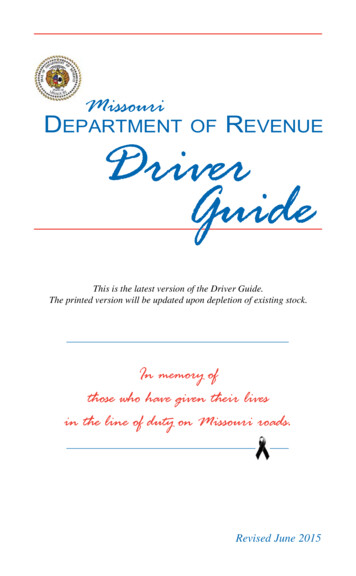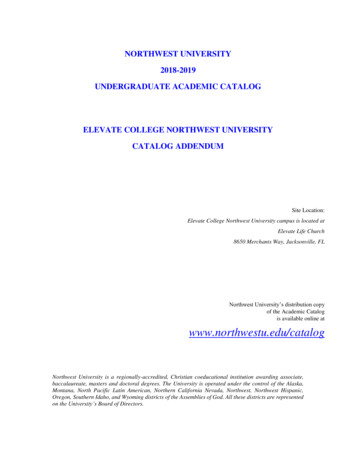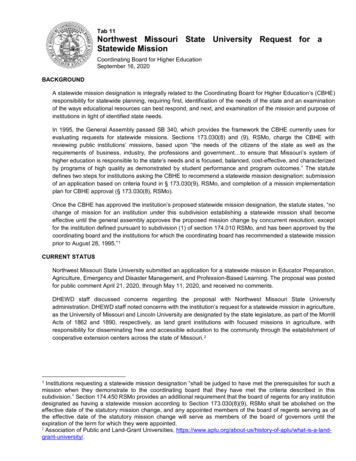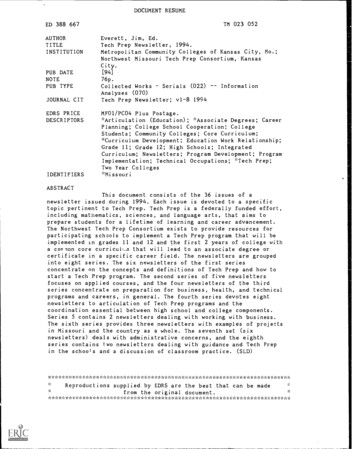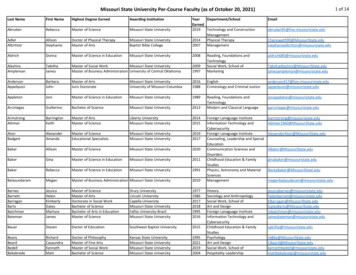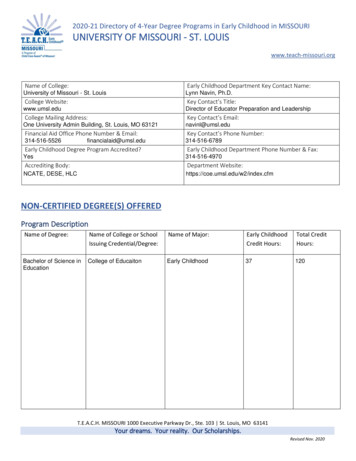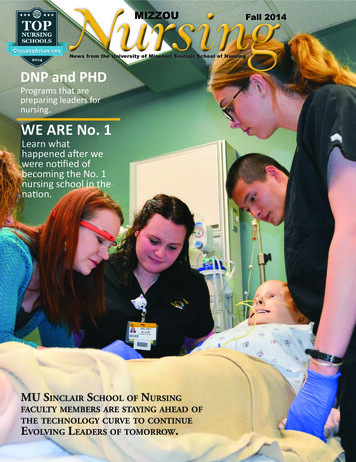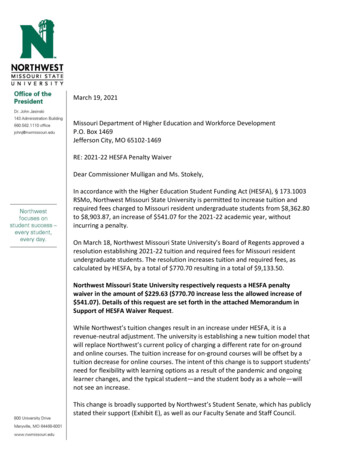
Transcription
March 19, 2021Missouri Department of Higher Education and Workforce DevelopmentP.O. Box 1469Jefferson City, MO 65102-1469RE: 2021-22 HESFA Penalty WaiverDear Commissioner Mulligan and Ms. Stokely,In accordance with the Higher Education Student Funding Act (HESFA), § 173.1003RSMo, Northwest Missouri State University is permitted to increase tuition andrequired fees charged to Missouri resident undergraduate students from 8,362.80to 8,903.87, an increase of 541.07 for the 2021-22 academic year, withoutincurring a penalty.On March 18, Northwest Missouri State University’s Board of Regents approved aresolution establishing 2021-22 tuition and required fees for Missouri residentundergraduate students. The resolution increases tuition and required fees, ascalculated by HESFA, by a total of 770.70 resulting in a total of 9,133.50.Northwest Missouri State University respectively requests a HESFA penaltywaiver in the amount of 229.63 ( 770.70 increase less the allowed increase of 541.07). Details of this request are set forth in the attached Memorandum inSupport of HESFA Waiver Request.While Northwest’s tuition changes result in an increase under HESFA, it is arevenue-neutral adjustment. The university is establishing a new tuition model thatwill replace Northwest’s current policy of charging a different rate for on-groundand online courses. The tuition increase for on-ground courses will be offset by atuition decrease for online courses. The intent of this change is to support students’need for flexibility with learning options as a result of the pandemic and ongoinglearner changes, and the typical student—and the student body as a whole—willnot see an increase.This change is broadly supported by Northwest’s Student Senate, which has publiclystated their support (Exhibit E), as well as our Faculty Senate and Staff Council.
Furthermore, Northwest continues to focus on affordability and flexibility for ourstudents, which is evidenced in many ways including our competitive net price(Exhibit C), which is in the lower one-third of our peers including for families withincomes between 30,000 and 110,000, and responding to students’ desire tohave flexibility in course scheduling through a single blended rate (Exhibits A & B) –all while providing significant economic impact and being the most efficientinstitution in the state.Finally, according to a report released by the Missouri Department of HigherEducation and Workforce Development in January 2021, Northwest is the mostefficient among state universities for state appropriations per degree andcertificate granted (see Exhibit D). Also, Northwest receives the second-lowest levelof funding per full-time equivalent, while experiencing enrollment increases (seeExhibit D). This is all evidenced by sustained and focused discipline as Northwestgenerated 87.7 million in cost containment and efficiencies between 2012 and2020 and cut institutional debt by more than half since 2009.Please feel free to let me know if you have any questions or would like additionalinformation.Sincerely,John Jasinski, Ph.D.PresidentEncl: Memorandum and exhibitscc: Stacy Carrick, Mary Collins
MEMORANDUM IN SUPPORT OF HESFA WAIVER REQUESTThe Higher Education Student Funding Act (HESFA) accomplishes three objectives. First, itrequires public universities to report their tuition rates to the Coordinating Board for HigherEducation (CBHE). Second, it establishes financial penalties for universities that increase tuitionmore than authorized by a series of calculations. Finally, the HESFA establishes a framework forthe commissioner of higher education to waive these financial penalties when an institutionsubmits a waiver request that is “sufficiently warranted.” Mo. Rev. Stat. §173.1003; 6 CSR 1014.010.When determining whether a waiver request is sufficiently warranted, “the factorsconsidered by the commissioner shall include but not be limited to the relationship between stateappropriations and the consumer price index and any extraordinary circumstances.” Mo. Rev. Stat.§ 173.1003.5. Northwest Missouri State University requests that Commissioner Mulligan approveits waiver request as sufficiently warranted for the reasons described in this memorandum.1. The increase in tuition for on-ground courses is offset by a decrease in tuition for onlinecourses, resulting in a single blended tuition rate that will apply to in-state undergraduatestudents.Northwest currently charges the following in-state undergraduate tuition rates: 212.76 for on-ground courses 222.76 for blended courses 242.76 for Northwest-Kansas City courses 252.76 for online coursesIn 2021-22, Northwest will change to a single blended rate - 238.45 – for theundergraduate courses outlined above. The Northwest Board of Regents approved implementing
the increase to achieve the single blended rate over two years (Exhibit A). In addition, the Board ofRegents approved the Student Senate’s recommendation to decrease our required fees (Exhibit A).The HESFA calculation evaluates only the tuition rate for on-ground courses, so theoffsetting decrease in Northwest’s online tuition rate has not been accounted for in the HESFAcalculation process.2. The new tuition model is revenue neutral for Northwest.In-state undergraduate students will pay the same in total tuition and fees to Northwestunder the new model (Exhibit B). In sum, when we account for the offsetting decrease inNorthwest’s online tuition rate, the new model is revenue neutral.The HESFA statute and regulations are premised on limiting “growth in [university]revenues in excess of the [consumer price index]”. 6 CSR 10-14(5)(B). Northwest’s new tuitionmodel does not result in revenue growth.3. The new tuition model benefits students.Most students take a mixture of online and on-ground courses. The new model will cost astudent taking only on-ground courses slightly more in tuition and fees, and it will cost a studenttaking only online courses slightly less. However, the “typical” student who takes a mixture ofonline and on ground courses will pay about the same amount.The university’s previous model of charging different rates for online and on-groundcourses has been scrutinized by the student body. Northwest’s Student Senate stated their supportfor the new model publicly at the Board of Regents meeting where the new model was approved(Exhibit E). The new model is fairer and more transparent for students. Students will be betterequipped to estimate the cost of their education. It removes financial impact from the calculuswhen a student is deciding which courses and modalities to take. It also recognizes the modern
reality that the line between “on-ground” and “online” courses has blurred and includes a twoyear implementation designed to focus on affordability and respond to student preferences withsupport from the Faculty Senate, Staff Council and Board of Regents.4. The penalty waiver decision criteria for “extraordinary circumstances” set forth in6 CSR 10-14.010(5)(B) support a waiver.This tuition change can be approved without considering the criteria set forth in the HESFAimplementing regulation because it does not result in “growth in [university] revenues in excess ofthe [consumer price index],” and the HESFA statute and regulations are premised on limiting suchgrowth. 6 CSR 10-14.010(5)(B).However, the penalty waiver decision criteria set forth in 6 CSR 10-14.010(5) also supportNorthwest’s HESFA penalty waiver request.“Historical trends in . . . tuition policy [ ] and other financial issues and relationships” and“[t]he current and [ ] historical structure of [Northwest’s] total budget” support Northwest’srequest. 6 CSR 10-14.010(5)(B)(2), (5). Historically, tuition for online courses was higher becauseexpenses (technology, personnel, etc.) associated with delivering those courses were higher. Asmore courses (on-ground and online) incorporated online and technology-based components,those extra expenses have now been spread over the university’s entire operations and can nolonger be properly attributed only to online courses. The new tuition model will adjust the tuitionstudents pay to match this shift in expenses.Mandatory costs and costs related to the institution’s mission, strategic initiatives, andneeds support Northwest’s waiver request. 6 CSR 10-14.010(5)(B)(1), (3)-(4). Mandatory costshave risen dramatically. Examples include the university’s required contribution under MOSERSand CURP (increased 15.1 million or 389.2% FY10 to FY20) and health care expenses under the
university’s medical plan (increased 2.6 million or 62.3% FY10 to FY20). Northwest must alsoaddress expenses related to its physical infrastructure and labor needs. Northwest has taken greatstrides to become as efficient as possible, recording nearly 90 million in efficiencies and costsavings during the last decade. If Northwest were forced to blend its tuition at a lower rate (onethat would not be revenue neutral), Northwest would not be able to appropriately manageincreases in mandatory and other costs.Moreover, as set forth above, the tuition change is revenue neutral and will not have anegative financial impact on most students. Accordingly, the “magnitude of tuition increase andthe likely impact on the students of the institution” criterion supports Northwest’s request. 6 CSR10-14.010(5)(B)(8).For the reasons set forth herein, Northwest requests that Commissioner Mulligan approveits HESFA penalty waiver request as sufficiently warranted based on extraordinary circumstancespursuant to Mo. Rev. Stat. §173.1003 and 6 CSR 10-14.010.
Exhibit ABoard of Regents Proposal and ResolutionNorthwest Missouri State University Board of RegentsDate of Meeting: March 18, 2021Agenda Item: Academic Year 2021-22 Rate ScheduleLead: VP of Finance and Administration Stacy Carrick and AVP of Finance Mary CollinsOpen or Closed agenda item? OPENIssue Description and Proposal (as approved by the President):This agenda item seeks approval for the Academic Year 2021-22 Rate Schedule, including tuition andfees, room and board rates, and supplemental fees.The overall proposal is to book the allowable undergraduate resident tuition rates provided by theDepartment of Higher Education and Workforce Development (DHEWD) under the Higher EducationStudent Funding Act (HESFA) including a waiver to create a single blended tuition rate that will applyto undergraduate students excluding our online professional programs and be implemented over atwo-year period (FY22 and FY23). The single blended tuition rate is prompted by several factors,including post-pandemic student expectations and faculty capabilities, current and prospectivestudent preference for flexibility and our Student Senate desiring this move and overwhelminglysupporting the rate increase with implementation over a two-year period. Student Senate alsoapproved to reduce their co-curricular designated fees and there are no proposed changes fortechnology, textbook fees or course fees. Furthermore, the proposal includes increases to onlineprofessional tuition rates based on market and increases to meal plans and room rates based on CPI.As you know, our core competencies include being safe, trusted, invested and resourceful, or STIR,and we enjoy peer-leading metrics across so many measures. Additionally, a report released by theMissouri Department of Higher Education and Workforce Development in January shows Northwestis the most efficient among state universities for state appropriations per degree and certificategranted. Further, it shows that Northwest receives the second-lowest level of funding per full-timeequivalent – all while we’ve experienced enrollment increases last fall and an all-time highestgraduate enrollment this spring, in addition to those peer-leading metrics. Not only are we trustedand invested, but we are the most resourceful in the state with the dollars we receive.Further, Northwest continues to focus on affordability with 98 percent of our first-time, full-timestudents receiving some type of financial assistance. The University has achieved cost containmentand efficiency measures in excess of 87 million between 2012 and 2020 while our net price hasremained competitive over time in our commitment to strengthen access and affordability. Ouraverage net price is favorable compared to the average of our top competitors in Missouri, Iowa,Nebraska and Kansas. The average student indebtedness is lower than both state and nationalaverages. Additionally, our placement rates for undergraduates and graduates are 96 percent.Our approach is focused on affordability, strategic investments in enrollment, program growth andstudent need-based scholarship support while protecting the use of reserves. Northwest reviews and
analyzes respective CPI rates for tuition, housing and food as well as projected inflationary costs (e.g.,utilities, health insurance, license agreements, etc.). Key proposed changes in the Academic Year2021-22 Rate Schedule are summarized below.UNDERGRADUATETuitionThe proposal for undergraduate residents is to book with DHEWD the allowable HESFA rate based on1.4% CPI, year-over-year decrease in state appropriations and a waiver to create a single blendedtuition rate that will apply to undergraduate students excluding our online professional programs andbe implemented over a two-year period (FY22 and FY23). The same methodology is used for bothresident and non-resident undergraduate students. In addition, the phased implementation periodprovides a mechanism to continue our focus on affordability for our students while limiting the use ofreserves over a two-year implementation period.The full booked amount is an estimated average annual net price increase of 460 for anundergraduate resident and an estimated average annual net price increase of 480 for anundergraduate non-resident.The implemented rate for undergraduate residents in academic year 2021-22 would result in a 4.0%increase or an estimated average annual net price increase of 265. The tuition for undergraduatenon-residents would result in an estimated average annual net price increase of 307.Designated, Technology and Textbook FeesThe proposal is to decrease student-approved designated fees by 0.10 as voted by Student Senate.The change will reduce the co-curricular fee from 0.50 to 0.40. There are no changes for technologyor textbook fees.Other Undergraduate ProgramsOther undergraduate programs represent courses that are generally provided off‐campus and havenon‐standard tuition and fee rates to cover costs that vary from traditional courses.GRADUATETuitionThere are no proposed changes for traditional graduate program tuition.General and Technology FeesThere are no proposed changes for general and technology usage fees.Other Graduate ProgramsOther graduate programs represent courses that are generally provided off‐campus and have non‐standard tuition and fee rates to cover costs that vary from traditional courses.ONLINE PROFESSIONALThe proposal is to realign education and nursing within the online professional program portfolio whilemaintaining competitive market strategy. The programs will be aligned to the respective undergraduate onlineprofessional tuition rate of 299 per credit hour and graduate online professional tuition rate of 350 percredit hour.
COURSE FEESThere are no proposed changes for course fees.ROOM AND MEAL PLAN RATESThe proposal is to increase room and board rates on average 3.0% to align with CPI. The estimatedannual increase for residential housing is 162 and a range of options for meal plans based on type ofplan with an estimated annual increase of 116. The meal plan rate adjustment is based on theMidwest Region food-away-from-home CPI and the current dining contract.SUPPLEMENTAL FEESSupplemental fees include additional academic and administrative services students may incur duringtheir academic career at the University. Finance works with departments throughout the year toreview the revenues and expenses of various programs and services in establishing and updatingrates.Key Considerations for the Board of Regents:1. What are the overall impacts of these proposed changes on students?2. How will these proposed changes help address academic quality and changes in state operating support?3. What are the impacts should we not approve the proposed tuition and fees or room and board rates?Proposed Resolution: I move to approve the Academic Year 2021-22 Rate Schedule as presented.Note: Academic Year FY21-22 Rate Schedule Excerpt for Undergraduate Courses excerpt follows:
Exhibit BWaiver Calculations
Exhibit CCost of Attendance and Net Price ComparisonsCOST OF ATTENDANCE & NET PRICE COMPARISON (FY2018-19)InstitutionGraduationCost ofCOAStateNameRateAttendance RankingMOMissouri Southern State University32%17,6661MOMissouri Western State University38%20,5757KSFort Hays State University43%18,0482MOSoutheast Missouri State University50%21,57010MONorthwest Missouri State University52%19,7513NEUniversity of Nebraska at Omaha50%22,30013MOTruman State University75%21,3299MOUniversity of Central Missouri51%19,9535KSWashburn University46%22,05612KSPittsburg State University52%19,9024KSEmporia State University50%20,0886IAIowa State University74%21,1868MOUniversity of Missouri-Columbia71%26,76617MOUniversity of Nebraska at Kearney56%23,04014MOMissouri State University-Springfield56%21,78211IAUniversity of Iowa72%24,23915NEUniversity of Nebraska-Lincoln66%24,93616Source: IPEDS Data Center and College 7,09317
Exhibit DState Appropriations
Exhibit EStudent Senate Letter of Support
RSMo, Northwest Missouri State University is permitted to increase tuition and incurring a penalty. On March 18, Northwest Missouri State University's Board of Regents approved a resolution establishing 2021-22 tuition and required fees for Missouri resident undergraduate students. The resolution increases tuition and required fees, as
